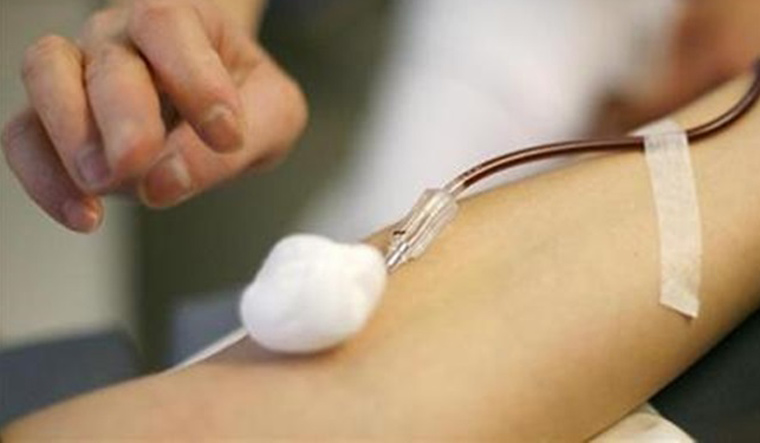Donating blood is a simple and safe way to impact people's lives. Experts say that a single unit of donated blood can save up to three lives. Each day, thousands require blood transfusions for various reasons including surgeries, traumatic injuries, and chronic illnesses. Excessive blood loss can result in death, medically referred to as exsanguination. This is where blood donation plays a vital role.
Typically, a regular donation consists of around 450 ml of whole blood, approximately 8 per cent of the average adult's blood volume. The body replenishes this volume within 24 to 48 hours, while red blood cells are regenerated within 10 to 12 weeks. Depending on an individual's gender and body type, the typical human body contains 4-6 litres of blood.
The slogan for the campaign this year is, 'Give blood, give plasma, share life, share often'. The Secretary General of the Indian Red Cross Society in a statement said, “The campaign this year focuses on patients requiring life-long transfusion support and underlines the role every single person can play, by giving the valuable gift of blood. It also emphasises the significance of donating blood or plasma on a regular basis to provide a safe and sustainable supply of blood and blood products that is always available, all over the world, so that all patients in need can receive timely treatment.”
According to Australian Red Cross, almost half of the blood donated is made up of water. To prevent feeling faint and dizzy due to a drop in blood pressure, it is essential to stay well-hydrated. Adequate sleep of seven to nine hours the night before donation helps improve alertness and reduces the risk of feeling unwell. Maintaining a balanced diet, particularly including iron-rich foods, helps maintain haemoglobin levels.
According to experts, individuals are advised to refrain from donating if they are feeling unwell. Donors are advised to avoid smoking or drinking as the presence of alcohol and nicotine in the blood can be detrimental to the recipient. Do not donate on an empty stomach, as the process can temporarily affect your blood pressure. Low blood pressure may cause dizziness, shivering, which could get exacerbated if you have not eaten beforehand.
Donors need to ensure that any current medications they use permit blood donation. Experts advise platelet donors to refrain from taking aspirin for two days before the donation. Donors are advised not to discontinue any medications for the purpose of blood donation without consulting a healthcare professional.
Post-donation, some may experience fatigue, dizziness, light-headedness, or nausea and these symptoms are typically caused by a temporary decrease in blood pressure. Consuming plenty of water would help regulate blood pressure and prevent it from dropping too low.
Donors are recommended to take rest at least for five minutes post donation process. Individuals are advised to avoid vigorous exercise and heavy lifting, before and after donation, to allow body to rest and replenish the lost fluids, reducing the risk of dizziness.
Minor bruising around the needle site is normal and it usually resolves on its own within a few days. Experts advise that applying a cold compress to the bruised area can help reduce swelling and promote faster healing.
To replenish the body post-blood donation, donors are advised to consume well-balanced meals and increase fluid intake for the next 24 to 48 hours. Donors are advised not to consume fizzy beverages or aerated drinks. Avoid standing for prolonged periods, smoking for at least four hours, and alcohol for 24 hours.
Who can donate blood?
As per government guidelines, any healthy adult, regardless of gender, has the potential to donate blood. A safe donation consists of one unit, equivalent to 350 ml. Men can donate every three months, while women can donate every four months. However, certain criteria like a minimum weight of 45 kilos, a normal pulse rate of 50 to 100 beats per minute, a body temperature not exceeding 37.5 degrees Celsius, haemoglobin level not less than 12.5 grams per decilitre, and blood pressure within the normal range of systolic 100/180 mm Hg has to be met while donating. Donors should be between the age of 18 and 60, with some states permitting legal minors to donate with parental permission. Although there is no legal upper age limit, specific policies may vary among individual donor centres.
According to National State Blood Transfusion Council, those in high-risk categories, such as those with a history of genital ulcers, multiple sex partners, or drug addiction, are ineligible for blood donation. Intravenous administration of drugs, presence of Hepatitis B, Hepatitis C, tuberculosis, leprosy, HIV, heart disease, epilepsy, bleeding disorders, thalassemia, sickle cell anaemia, and cancer are additional disqualifying factors, according to Council. Recent vaccinations for cholera, typhoid, diphtheria, tetanus, plague, gamma globulin within the past 15 days, or rabies vaccination within the past year, also prevent blood donation.
According to the Council, tattoos, acupuncture, or tattoo removal surgery within the past 6 months render an individual ineligible. Recent treatment for malaria within the past three months or residing in malaria-endemic areas within the past three years disqualify a person from donating. Pregnancy, delivery within the past year, or breastfeeding are also factors that make one unable to donate blood.
COVID-19 Concerns
According to reports, the virus responsible for COVID-19 has not been proven to spread through blood transfusions. However, the US Food and Drug Administration recommends a waiting period of at least 10 days after a positive diagnostic test for COVID-19 without symptoms, or until all symptoms have disappeared, before donating blood.



